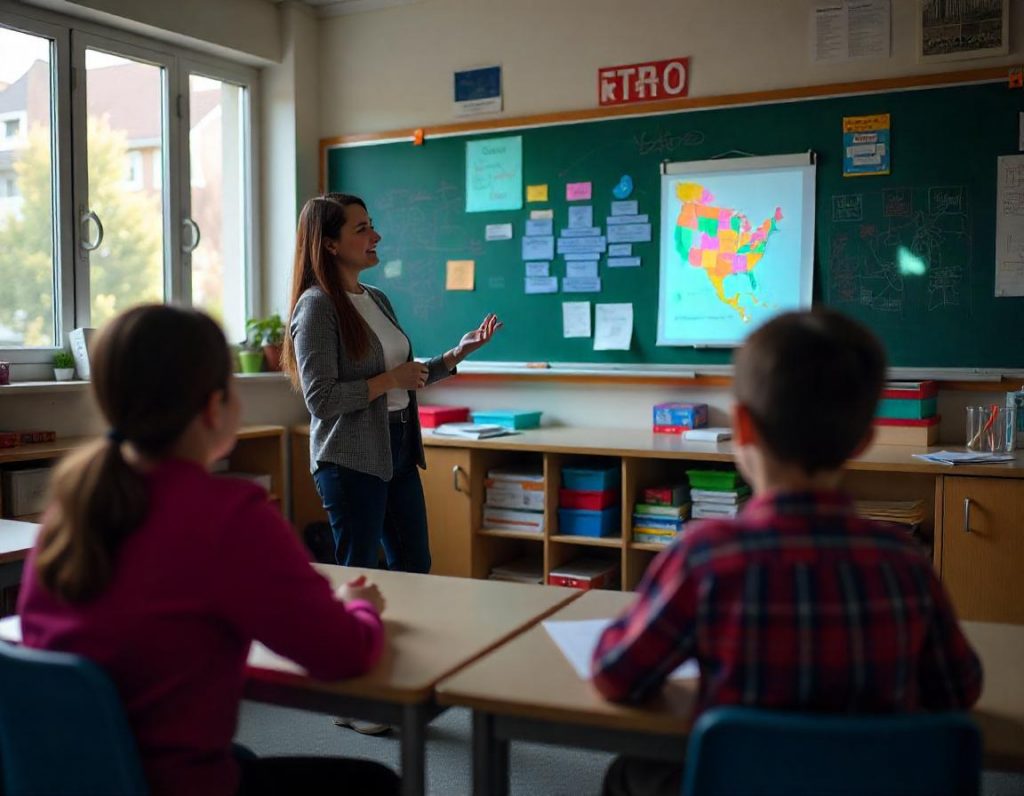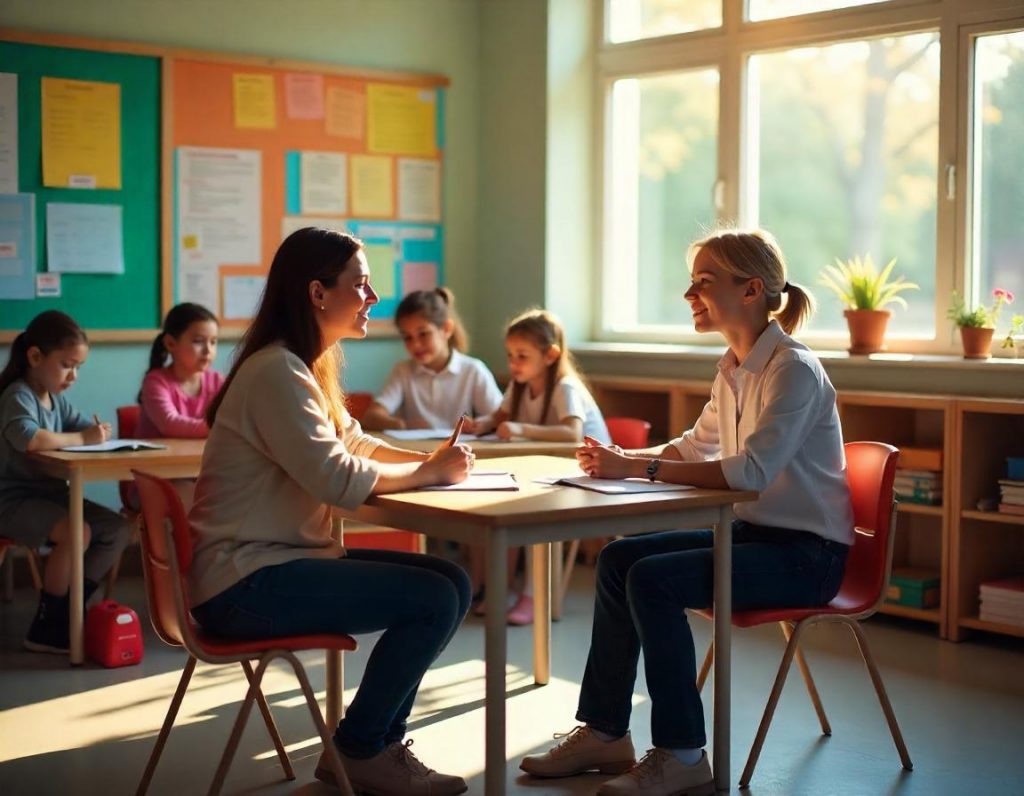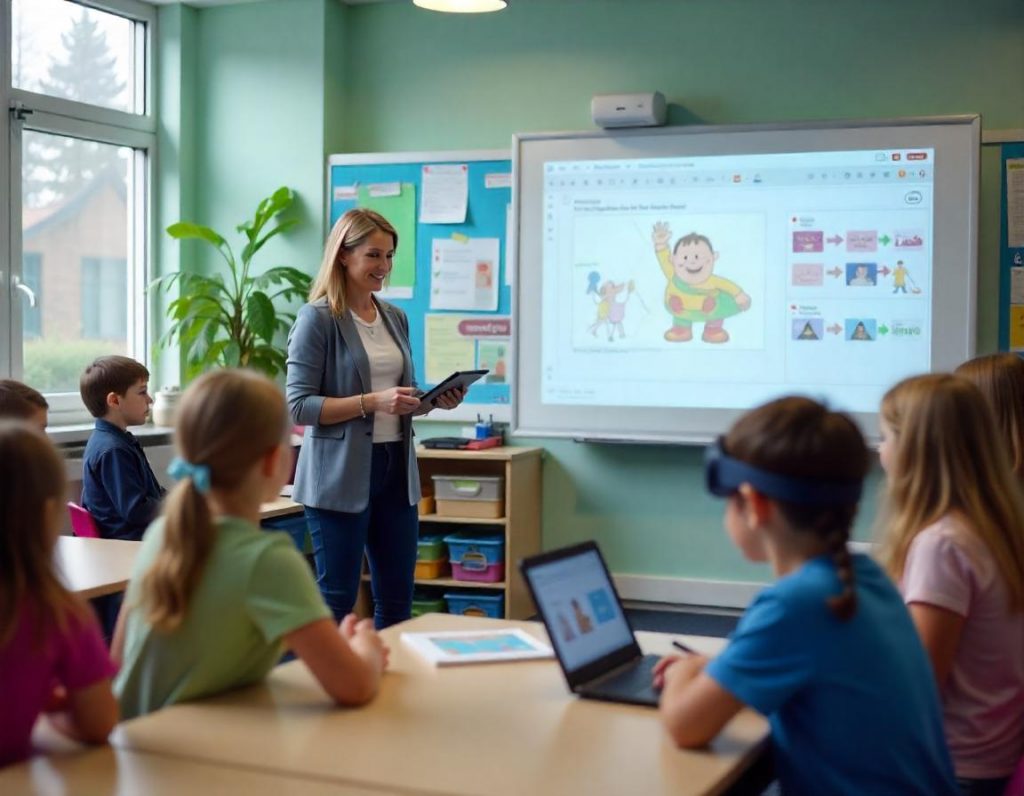Being a primary school teacher can be exhausting and a fun experience at the same time. But kudos to you for wanting and choosing to become one.
Primary school is where a child’s foundation is built, and the teacher plays a vital role in shaping the child’s future. As applying for a teaching position in Primary School requires giving an interview to the school administration in most cases, one might feel nervous.
Teacher interview questions can be tricky, but sometimes, it is only really about expressing your true self.
While preparing for primary teacher interview questions and answers doesn’t guarantee full marks in the interview, as it is upto the administration what kind of questions they ask (which can be unique), going through some sample primary teacher interview questions would boost confidence and provide a head-start in the interview.
So here are the top 50 teacher interview questions and answers. With practical advice, examples, and actionable tips, you’ll feel confident walking into your next interview.
Quick Checklist for Primary Teacher Interviews
Use this quick checklist to track your interview preparation:
Have you researched the school’s mission and teaching approach?
Do you have examples of your teaching strategies and successes?
Are you familiar with common interview questions and prepared answers?
Have you planned your own questions to ask the interviewer?
If you’re ticking these boxes, you’re off to a great start!
Primary Teacher Interview Questions and Answers
Below, we have provided the most common interview questions based on various themes for a primary teacher.

Basic Interview Questions for Primary Teacher Interview
These basic primary teacher interview questions help interviewers understand your motivations and personality.
Q1. Tell us about yourself.
Sample Answer: “I hold a degree in Elementary Education and have three years of experience teaching in diverse classroom settings. I focus on interactive teaching methods that encourage participation and creativity. In my previous role, I increased student engagement by introducing project-based learning.“
Q2. Why did you choose to become a primary school teacher?
Sample Answer: “I’ve always been passionate about nurturing young minds and inspiring a love for learning. During college, I volunteered at a children’s learning center, where I helped struggling readers improve their skills. Seeing their confidence grow made me realize the profound impact teachers have, which solidified my decision to pursue this career.”
Q3. What are your strengths as a teacher?
Sample Answer: “My strengths include creativity in lesson planning, effective classroom management, and building strong relationships with students. For instance, I once used a storytelling approach to teach math concepts, which my students found engaging and memorable.“
Q4. What are your weaknesses?
Sample Answer: “I sometimes tend to spend too much time perfecting my lesson plans. However, I’ve learned to streamline my planning process by setting priorities and balancing creativity with practicality.“
Q5. How do you define success as a teacher?
Sample Answer: “Success as a teacher means helping every student achieve their potential academically and personally. I measure success by the progress my students make and the enthusiasm they show for learning.“
Classroom Management Questions for Primary Teacher Interview
Effective classroom management is a cornerstone of successful teaching.
Q6. How do you maintain discipline in the classroom?
Sample Answer: “I establish clear expectations at the start of the year and ensure consistency. For example, I create a collaborative set of rules with the students so they feel responsible for maintaining a positive environment. I also use positive reinforcement, like reward charts, to encourage good behaviour.”
Q7. What strategies do you use for managing a noisy class?
Sample Answer: “I use non-verbal cues like hand signals or clapping rhythms to regain attention. Once students understand the routine, they respond quickly. I also integrate brain breaks to channel their energy productively during long lessons.”
Expert Insights: Key Phrases to Use in an Interview
- “I focus on making learning engaging and inclusive for every child.”
- “I believe in fostering curiosity while maintaining structure in the classroom.”
- “I enjoy working collaboratively with parents and colleagues to support student success.”
Q8. How do you handle a disruptive student?
Sample Answer: “I address the issue calmly and privately to understand their behavior. For instance, I once had a student who interrupted lessons frequently. I discovered they enjoyed leading discussions, so I gave them small tasks like being a ‘discussion monitor.’ This helped them stay engaged positively.”
Q9. How do you manage students with diverse learning styles?
Sample Answer: “I incorporate multiple teaching methods, such as visual aids, hands-on activities, and group discussions. For example, during a lesson on fractions, I used paper cutouts for visual learners and puzzles for hands-on learners. Everyone participated comfortably.”
Q10. How do you motivate students to stay focused?
Sample Answer: “I create lessons that are interactive and tailored to their interests. During a history lesson, I once transformed the classroom into an archaeological site, which kept students curious and engaged.”
Subject-Specific Pedagogy-Based Interview Questions for Primary Teachers
These questions test your ability to teach specific subjects effectively.

Q11. How do you teach math to students with different learning levels?
Sample Answer: “I use differentiated instruction. Advanced learners might solve word problems, while others work with visual aids like number lines. This ensures that each student learns at their own pace while still feeling included.“
Q12. How do you make reading enjoyable?
Sample Answer: “I organize activities like read-aloud sessions where students take turns acting out scenes. I also create a cosy reading corner with books that cater to their interests, which helps develop a love for reading.“
Q13. How do you make math lessons engaging?
Sample Answer: “I use real-life examples, games, and hands-on activities to make math relatable. During a unit on geometry, I had students design their own dream houses using shapes and measurements, which made the lesson both fun and practical.”
Q14. What’s your strategy for teaching early reading skills?
Sample Answer: “I focus on phonics and storytelling to build foundational skills. For instance, I use flashcards with simple words and have students form sentences with them. I also read aloud animatedly to model fluency and engage their interest.”
Q15. How do you encourage creativity in writing lessons?
Sample Answer: “I give students open-ended prompts and freedom to explore different genres. For example, I once asked them to write about a magical journey, and the diverse stories they created showcased their imagination and understanding of narrative structure.”
Q16. How do you assess student progress in science?
Sample Answer: “I use a mix of observations, hands-on experiments, and written reflections. For example, during a lesson on plant growth, students documented changes in their plants weekly. This project allowed me to assess their understanding of scientific observation and data collection.”
Q17. How do you integrate technology into your lessons?
Sample Answer: “I use tools like interactive whiteboards, learning apps, and digital storytelling platforms. During a history lesson, I used an app to create an interactive timeline that students could explore. This made the topic more engaging and helped them retain the information better.”
Behavioural and Situational Questions for Primary Teacher Interview
These questions assess how you handle challenges in the classroom.

Q18. What would you do if a student consistently refuses to participate?
Sample Answer: “I approach the situation with empathy and patience, first speaking to the student privately to understand their reluctance. I once had a student who was shy about group activities, so I paired them with a supportive peer and gave them a simpler role to start with. Gradually, they grew more confident and began contributing actively.“
Q19. How do you resolve conflicts between students?
Sample Answer: “I encourage open communication and guide them to find a solution together. When two students in my class argued over sharing materials, I introduced a rotation system that resolved the issue while teaching them the value of fairness.“
Q20. What would you do if a parent questioned your teaching methods?
Sample Answer: “I would listen to their concerns and provide clear explanations about my approach. For instance, when a parent questioned the use of group activities, I explained how they foster teamwork and communication skills. I also shared examples of how these methods have improved student outcomes.”
Q21. How do you handle days when lessons don’t go as planned?
Sample Answer: “I stay calm and adapt quickly. During one lesson, a planned activity took longer than expected, so I simplified the next task and reassessed my pacing for future lessons. Flexibility is essential for managing such situations.”
Q22: What’s your approach to teaching students with behavioral challenges?
Sample Answer: “I build trust and focus on understanding their triggers. For one student with frequent outbursts, I created a behavior chart with achievable goals and rewards. Collaborating with their parents and providing consistent support helped improve their behavior over time.”
Interview Questions on Technology and Innovation in Teaching
Show how you adapt to modern teaching tools and methods.

Q23. How do you use technology in your classroom?
Sample Answer: “I use tools like smartboards and educational apps like Kahoot to make lessons interactive. Recently, during a geography lesson, I used a virtual map to explore different countries with the class. It was engaging and made the topic more relatable.“
Q24. How do you teach online safety to students as a teacher?
Sample Answer: “I teach students to follow simple rules, like not sharing personal information and using only approved websites. I also supervise their activities during tech-based lessons to ensure they stay safe.“
Interview Questions on Teaching Philosophy

Q25. What is your teaching philosophy?
Sample Answer: “My teaching philosophy is centered on creating a student-focused learning environment where every child feels valued. I believe in fostering curiosity, critical thinking, and creativity through interactive and hands-on learning experiences. For example, I encourage collaborative projects where students solve real-world problems, such as designing solutions for environmental issues. This approach not only builds skills but also nurtures teamwork and responsibility.”
Q26. How do you foster inclusivity in your classroom?
Sample Answer: “Inclusivity begins with understanding and celebrating diversity. I integrate books, activities, and discussions that reflect different cultures and perspectives. During a lesson on traditions, I asked students to share stories about their family customs, which created a rich and engaging dialogue. This approach helps students feel seen and appreciated.”
Q27. How do you define success as a teacher?
Sample Answer: “Success is seeing my students thrive academically and socially. It’s not just about grades but their confidence and enthusiasm for learning. For example, I felt a sense of accomplishment when a once-shy student began actively participating in group discussions by the end of the year.”
Q28. What role does creativity play in your teaching?
Sample Answer: “Creativity makes lessons more engaging and helps students retain information better. I use art, storytelling, and role-playing to make learning dynamic. For instance, when teaching historical events, I assigned students roles and asked them to reenact key moments. This not only sparked their interest but also deepened their understanding.”
Q29. Why did you choose to become a primary school teacher?
Sample Answer: “I’ve always been passionate about nurturing young minds and inspiring a love for learning. During college, I volunteered at a children’s learning center, where I helped struggling readers improve their skills. Seeing their confidence grow made me realize the profound impact teachers have, which solidified my decision to pursue this career.”
Adaptability Based Interview Questions for Primary Teachers
Q30: How do you adapt to teaching a new curriculum?
Sample Answer: “When introduced to a new curriculum, I start by reviewing the objectives and aligning them with my existing teaching strategies. I also seek professional development opportunities to deepen my understanding. For instance, when my school adopted a STEM curriculum, I attended workshops to learn effective integration methods, which helped me redesign lessons accordingly.”
Q31: How do you support students with diverse learning needs?
Sample Answer: “I customise my lessons to meet individual needs by using differentiated instruction. For example, during reading time, I provided audiobooks for a student with dyslexia while offering advanced texts to others ready for more challenging material. This ensured every student felt supported and engaged.”
Q32: What’s your approach to teaching in a multilingual classroom?
Sample Answer: “I incorporate visual aids, gestures, and peer support to bridge language gaps. Once in my class while teaching, I paired students who spoke different languages and encouraged them to work collaboratively. I also used translation tools and simple phrases in multiple languages to make instructions clear.”
Q33. How do you help students adjust to new technology in the classroom?
Sample Answer: “I introduce technology step-by-step, starting with guided demonstrations. When I introduced digital storytelling, I walked students through creating a simple story using a digital tool, allowing them to explore it gradually. Providing one-on-one support for those who needed extra help ensured no one felt left behind.”
Q34: How do you handle unexpected changes to your lesson plan?
Sample Answer: “Flexibility is key. If a lesson doesn’t go as planned, I adjust by using alternative resources or activities. Once, during a power outage, I turned an interactive lesson into a group brainstorming session on the same topic. This kept students engaged and ensured learning continued despite the setback.”
Also Read: Important Teacher Interview Questions
Collaboration and Communication
Effective communication is key to building strong relationships with parents, students, and colleagues.
Q35. How do you collaborate with colleagues?
Sample Answer: “Collaboration is vital for sharing ideas and improving teaching strategies. I actively participate in team meetings and co-plan lessons. Once, I partnered with a science teacher to design an interdisciplinary project combining biology and art, which students found both engaging and educational.”
Q36. How do you resolve conflicts with colleagues?
Sample Answer: “I approach conflicts professionally, focusing on open communication and mutual respect. During a disagreement about classroom resources, I proposed a rotation system that ensured fairness and preserved our working relationship.”
Q37. How do you communicate with parents about their child’s progress?
Sample Answer: “I provide regular updates through progress reports and one-on-one meetings. During meetings, I share specific examples of their child’s achievements and discuss areas for improvement, along with actionable suggestions for home support.”
Q38. How do you involve parents in their child’s learning journey?
Sample Answer: “I keep parents informed through regular communication, such as newsletters and meetings. I also organize events like ‘Family Learning Night,’ where parents participate in fun educational activities with their children. This strengthens the partnership between home and school.”
Wrap-Up and Reflective Questions
Q39. What do you hope your students remember about you?
Sample Answer: “I hope they remember me as a teacher who believed in their potential and made learning exciting. My goal is to instill confidence and curiosity that extends beyond the classroom.”
Q40. Why should we hire you for this position?
Sample Answer: “I bring a blend of experience, enthusiasm, and adaptability to my teaching. My ability to connect with students, create engaging lessons, and collaborate with parents and colleagues aligns well with this school’s values.”
| Related Topics | |
|---|---|
| Online Teaching Jobs | Online Tutoring Jobs |
| Private School Interview Questions for Teachers | Teaching Job Application Format |
Job By Role:




